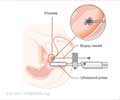Men with prostate cancer have a slightly better long-term side effects profile with radiation seed implants than they do with surgery, according to a study.
Men with prostate cancer have a slightly better long-term side effects profile with radiation seed implants than they do with surgery, according to a study.
Doctors in France conducted the first-ever multi-institutional, comparative study of men with early stage prostate cancer to evaluate a man’s quality of life, treatment-related side effects and cost of the treatment based on the type of treatment the patient received: surgery or seed implants, both widely-accepted modes of treatment for early-stage prostate cancer. With prostate surgery, called a radical prostatectomy, a surgeon removes the prostate. During prostate brachytherapy, a radiation oncologist places radioactive seeds, similar to the size of a grain of rice, into the prostate to kill the cancer.In this study, 435 men with prostate cancer were surveyed before treatment, immediately after treatment and subsequently at follow-up exams to gauge their quality of life and treatment-related side effects against predefined materials given to them by the doctors. Doctors found that brachytherapy is a more expensive procedure at the outset, but that follow-up costs related to surgery cause both treatments to cost about the same.
With regard to side effects, surgery had more significant side effects immediately following treatment, but those side effects improved steadily over two years. Brachytherapy, however, showed moderate, but persistent side effects over the two years. Urinary incontinence was more common after surgery; however, urinary irritation was a more common complaint from those who received brachytherapy. Impairment of sexual function was found to be consistently higher among those who received surgery than those who received brachytherapy.
“This study is exciting because it’s the first time we have a comparative study to assess the costs in a given country and see if the side effects are different for patients who received surgery or brachytherapy,” said Jean-Marc Cosset, M.D., one of the authors of the study and a radiation oncologist in the Department of Radiation Oncology at the Institut Curie in Paris, France. “By looking at these factors, we are better able to tailor a suitable treatment option for the individual patient.”
Source-Bio-Bio Technology
SRM

![Prostate Specific Antigen [PSA] Prostate Specific Antigen [PSA]](https://www.medindia.net/images/common/patientinfo/120_100/prostate-specific-antigen.jpg)







